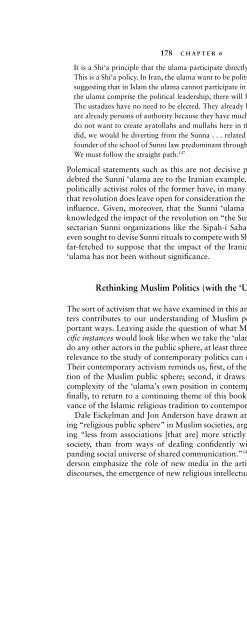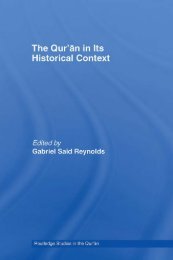Download (1 MB) - Islam and Christian-Muslim Relations: Articles ...
Download (1 MB) - Islam and Christian-Muslim Relations: Articles ...
Download (1 MB) - Islam and Christian-Muslim Relations: Articles ...
Create successful ePaper yourself
Turn your PDF publications into a flip-book with our unique Google optimized e-Paper software.
178 CHAPTER 6It is a Shi‘a principle that the ulama participate directly in government. ...This is a Shi‘a policy. In Iran, the ulama want to be political leaders. I am notsuggesting that in <strong>Islam</strong> the ulama cannot participate in politics. However, ifthe ulama comprise the political leadership, there will be no one to preach.The ustadzes have no need to be elected. They already have positions. Theyare already persons ofauthority because they have much knowledge. ...Wedo not want to create ayatollahs <strong>and</strong> mullahs here in the Philippines. Ifwedid, we would be diverting from the Sunna . . . related by Imam Shafii [thefounder of the school of Sunni law predominant throughout Southeast Asia].We must follow the straight path. 147Polemical statements such as this are not decisive proofofjust how indebtedthe Sunni ‘ulama are to the Iranian example. Yet the fact that thepolitically activist roles ofthe former have, in many cases, emerged afterthat revolution does leave open for consideration the possibility of Iranianinfluence. Given, moreover, that the Sunni ‘ulama have themselves acknowledgedthe impact ofthe revolution on “the Sunni youth,” <strong>and</strong> thatsectarian Sunni organizations like the Sipah-i Sahaba ofPakistan haveeven sought to devise Sunni rituals to compete with Shi‘i ones, it is scarcelyfar-fetched to suppose that the impact of the Iranian revolution on the‘ulama has not been without significance.Rethinking <strong>Muslim</strong> Politics (with the ‘Ulama in It)The sort ofactivism that we have examined in this <strong>and</strong> the previous chapterscontributes to our underst<strong>and</strong>ing of<strong>Muslim</strong> politics in several importantways. Leaving aside the question ofwhat <strong>Muslim</strong> politics in specificinstances would look like when we take the ‘ulama as seriously as wedo any other actors in the public sphere, at least three broad facets of theirrelevance to the study ofcontemporary politics can easily be singled out.Their contemporary activism reminds us, first, ofthe variegated compositionofthe <strong>Muslim</strong> public sphere; second, it draws our attention to thecomplexity ofthe ‘ulama’s own position in contemporary societies; <strong>and</strong>finally, to return to a continuing theme ofthis book, it suggests the relevanceofthe <strong>Islam</strong>ic religious tradition to contemporary <strong>Muslim</strong> politics.Dale Eickelman <strong>and</strong> Jon Anderson have drawn attention to an emerging“religious public sphere” in <strong>Muslim</strong> societies, arguing that it is emerging“less from associations [that are] more strictly the domain of civilsociety, than from ways of dealing confidently with others in an exp<strong>and</strong>ingsocial universe ofshared communication.” 148 Eickelman <strong>and</strong> Andersonemphasize the role ofnew media in the articulation ofreligiousdiscourses, the emergence ofnew religious intellectuals, <strong>and</strong> “new under-



